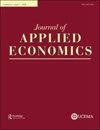沙皇的遗产:俄罗斯教育与工作的互补性
IF 2
4区 经济学
Q3 ECONOMICS
引用次数: 0
摘要
本文章由计算机程序翻译,如有差异,请以英文原文为准。
Legacy of the Czar: Complementarity between education and work in Russia
ABSTRACT Vocational school graduates enjoy a higher employment probability than other types of graduates across industrial economies. This may result from either the signaling effects of vocational school degrees or skill complementarity between vocational schooling and work experience. Regarding wage regressions, signaling effects should make the coefficient of the interaction term between years of schooling and work experience negative, whereas complementarity between education and work experience should increase this coefficient because the cross-derivative of output with respect to schooling and work experience is positive. Thus, the negativity of the interaction term between years of schooling and work experience decreases as schooling becomes more complementary to work. We find that the negativity of the interaction term is smaller for vocational track graduates than for general track graduates in Russia. This result is arguably because the Russian vocational track emphasizes complementarity between education and work to a greater degree than its general track.
求助全文
通过发布文献求助,成功后即可免费获取论文全文。
去求助
来源期刊

Journal of Applied Economics
ECONOMICS-
CiteScore
3.00
自引率
0.00%
发文量
57
审稿时长
40 weeks
期刊介绍:
The Journal of Applied Economics publishes papers which make a significant and original contribution to applied issues in micro and macroeconomics. The primary criteria for selecting papers are quality and importance for the field. Papers based on a meaningful and well-motivated research problem that make a concrete contribution to empirical economics or applied theory, in any of its fields, are especially encouraged. The wide variety of topics that are covered in the Journal of Applied Economics include: -Industrial Organization -International Economics -Labour Economics -Finance -Money and Banking -Growth -Public Finance -Political Economy -Law and Economics -Environmental Economics
 求助内容:
求助内容: 应助结果提醒方式:
应助结果提醒方式:


